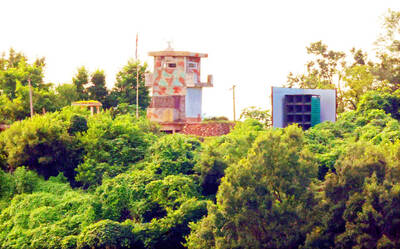A butchered Aesop’s fable from the Twitter account of the Chinese embassy in Ireland has drawn mirth from observers and highlighted the growing sensitivity of Chinese diplomats to international criticism.
As China engages in international disputes, the belligerent and aggressive style of communication of some of its foreign officials has earned the nickname “wolf warrior diplomacy.”
Thursday’s Twitter post pushed back on such accusations, but appeared to lose something in translation as the author navigated English allegories and the need to maintain an image of Chinese strength.
Riffing on the fable of the Wolf and the Lamb, a story of tyrannical injustice in which the lamb is falsely accused and killed, the post queried: “Who is the wolf?”
“Some people accused China for so-called ‘wolf-warrior diplomacy.’ In his well-known fable, Aesop described how the Wolf accused the Lamb of committing offences. The wolf is the wolf, not the lamb ... BTW, China is not a lamb.”
The confused analogy prompted attempts to unpack its meaning.
“[H]e leaps in with the fable of the wolf and the lamb ... but as he gets to the end, he realises he’s left himself open. China can’t be portrayed as a weak lamb that will be eaten up. China is strong, powerful! So he adds the ‘BTW,’” Foreign Policy deputy editor James Palmer said.
“I honestly don’t think the embassy staff meant to say that China is the wolf in this fable, but I scratch my head about what they meant to say through this fable,” said Victor Shih, a University of California, San Diego academic. “[If] it’s something like ‘China is innocent like the lamb in the fable except China is a wolf’ then don’t use the fable!”
While the Twitter post sparked ridicule, it also highlighted the growing enthusiasm of Chinese diplomats to show toughness.
“There’s always been this performative aspect of being an official in the party structure, but we’re hearing it louder now,” said Margaret Lewis, a China specialist at Seton Hall University, New Jersey.
Wolf warrior posts are usually made on Western social media platforms such as Twitter (banned in China). Some have landed a hit: an illustration and post about findings of suspected war crimes by Australian soldiers in Afghanistan prompted an angry news conference by the Australian prime minister, but Palmer said their intended audience is usually Chinese government superiors.
“It counts as success if your boss, or your boss’ boss, sees it and thinks it reflects the right political line,” Palmer said. “There’s maybe some small bonus in a dumb post that gets mocked a lot because if you’re getting measured for impact at all, it takes no account of the qualitative impact, only the quantifiable one.”

Philippine President Ferdinand Marcos Jr has fired his national police chief, who gained attention for leading the separate arrests of former Philippine president Rodrigo Duterte on orders of the International Criminal Court and televangelist Apollo Carreon Quiboloy, who is on the FBI’s most-wanted list for alleged child sex trafficking. Philippine Executive Secretary Lucas Bersamin did not cite a reason for the removal of General Nicolas Torre as head of the 232,000-member national police force, a position he was appointed to by Marcos in May and which he would have held until 2027. He was replaced by another senior police general, Jose

POWER CONFLICT: The US president threatened to deploy National Guards in Baltimore. US media reports said he is also planning to station troops in Chicago US President Donald Trump on Sunday threatened to deploy National Guard troops to yet another Democratic stronghold, the Maryland city of Baltimore, as he seeks to expand his crackdown on crime and immigration. The Republican’s latest online rant about an “out of control, crime-ridden” city comes as Democratic state leaders — including Maryland Governor Wes Moore — line up to berate Trump on a high-profile political stage. Trump this month deployed the National Guard to the streets of Washington, in a widely criticized show of force the president said amounts to a federal takeover of US capital policing. The Guard began carrying

Ukrainian drone attacks overnight on several Russian power and energy facilities forced capacity reduction at the Kursk Nuclear Power Plant and set a fuel export terminal in Ust-Luga on fire, Russian officials said yesterday. A drone attack on the Kursk nuclear plant, not far from the border with Ukraine, damaged an auxiliary transformer and led to 50 percent reduction in the operating capacity at unit three of the plant, the plant’s press service said. There were no injuries and a fire sparked by the attack was promptly extinguished, the plant said. Radiation levels at the site and in the surrounding

‘DELIBERATE PROVOCATION’: Pyongyang said that Seoul had used a machine gun to fire at North Korean troops who were working to permanently seal the southern border South Korea fired warning shots at North Korean soldiers that briefly crossed the heavily fortified border earlier this week, Seoul said yesterday after Pyongyang accused it of risking “uncontrollable” tensions. South Korean President Lee Jae-myung has sought warmer ties with the nuclear-armed North and vowed to build “military trust,” but Pyongyang has said it has no interest in improving relations with Seoul. Seoul’s military said several North Korean soldiers crossed the border on Tuesday while working in the heavily mined demilitarized zone (DMZ) separating the two Koreas. The incursion prompted “our military to fire warning shots,” South Korea’s Joint Chiefs of Staff